brain

 Many advancements have been made in our world through the studies of science. Still, sometimes, scientists take their study of science just a little bit too far, in the name of science. There isn’t a person in the world who hasn’t heard of Albert Einstein. He was not only the iconic, but common to geniuses, Einstein was also eccentric. Nevertheless, he was a brilliant scientist, mathematician, and one of the most intelligent people in history. Because of his brilliance, Einstein also knew that upon his death, there would undoubtedly be some crazy scientist who would want to study his brain. I can’t imagine knowing that my brain would be in demand, and in fact might be stolen after I had died. That seems totally insane to me, but for Einstein, it was a very real possibility. Knowing that, Einstein left detailed instructions to cremate his body and not to allow any brain examinations.
Many advancements have been made in our world through the studies of science. Still, sometimes, scientists take their study of science just a little bit too far, in the name of science. There isn’t a person in the world who hasn’t heard of Albert Einstein. He was not only the iconic, but common to geniuses, Einstein was also eccentric. Nevertheless, he was a brilliant scientist, mathematician, and one of the most intelligent people in history. Because of his brilliance, Einstein also knew that upon his death, there would undoubtedly be some crazy scientist who would want to study his brain. I can’t imagine knowing that my brain would be in demand, and in fact might be stolen after I had died. That seems totally insane to me, but for Einstein, it was a very real possibility. Knowing that, Einstein left detailed instructions to cremate his body and not to allow any brain examinations.
As sometimes happens, even when a detailed and legal will is written, there are those who do not necessarily think that it needs to be followed. I think that is just heinous!! When Einstein died in 1955, a scientist named Thomas Stoltz Harvey conducted the autopsy. This man completely disregarded the will that was written by Albert Einstein, and despite the family not granting permission, he stole Einstein’s brain and took it to the University of Philadelphia to study it. When they found out about the theft, Einstein’s family decided to give 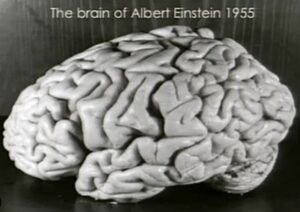 permission to Harvey to go ahead and study Einstein’s brain, as long as he published the finding in a scientific magazine. At that point they had few other options. Still, I believe it was a criminal act, and Harvey should have been punished to the fullest extent of the law.
permission to Harvey to go ahead and study Einstein’s brain, as long as he published the finding in a scientific magazine. At that point they had few other options. Still, I believe it was a criminal act, and Harvey should have been punished to the fullest extent of the law.
After, Harvey stole Einstein’s brain, “it was preserved, photographed, dissected, and even mailed to other scientists in hopes that studying it might uncover the source of his genius. Over decades, several interesting features of his brain have been discovered, including more extensive connections between the two hemispheres of his brain, a lighter than average weight, and an enlarged lateral sulcus. The part of his brain dedicated to mathematical and spatial thought, the inferior parietal lobe, was larger than average as well.” These days, you can view his brain (now with permission from his family)…or what is left of it after the mutilation it was subjected to, in the permanent exhibitions of the Mütter Museum in Philadelphia, Pennsylvania.
I don’t think “in the name of science” should be a license to steal something that belongs to someone else. Their body parts, whether needed for a transplant or for scientific study, should not be allowed. If a person wanted their body donated for science or transplant, they would have stated as much. I understand a family allowing a transplant if no specific instructions were given, but when specific instructions were given, as in the case of Albert Einstein, how dare someone decide that their desires are more important than the desires of the 
 deceased!! Once the damage was done, and the brain was stolen, Einstein’s family made the decision not to prosecute, but rather to allow the scientific testing. It was a gracious move on their part, and an act of mercy that was most certainly not earned by one Thomas Stoltz Harvey!! I also speculate that it could have opened the door for additional victims…allowed in the name of science. This was just wrong…in so many ways!!
deceased!! Once the damage was done, and the brain was stolen, Einstein’s family made the decision not to prosecute, but rather to allow the scientific testing. It was a gracious move on their part, and an act of mercy that was most certainly not earned by one Thomas Stoltz Harvey!! I also speculate that it could have opened the door for additional victims…allowed in the name of science. This was just wrong…in so many ways!!
 Miracles happen every day, whether we realize it or not. Each and every day, people’s lives are changed, people are healed, and circumstances are corrected, in ways that have no logical, scientific, medical, or financial reason. One such case occurred in 2007. A man went to the hospital because he was experiencing minor weakness in his left leg. Of course, as hospitals do, they ran a battery of tests. When they did a CT scan and an MRI, they were shocked to find that the man had an unusually tiny brain. When I say unusually tiny, I don’t mean a little smaller than normal, I mean a lot smaller than normal. Even more amazing was the fact that the man was more or less normal and functional.
Miracles happen every day, whether we realize it or not. Each and every day, people’s lives are changed, people are healed, and circumstances are corrected, in ways that have no logical, scientific, medical, or financial reason. One such case occurred in 2007. A man went to the hospital because he was experiencing minor weakness in his left leg. Of course, as hospitals do, they ran a battery of tests. When they did a CT scan and an MRI, they were shocked to find that the man had an unusually tiny brain. When I say unusually tiny, I don’t mean a little smaller than normal, I mean a lot smaller than normal. Even more amazing was the fact that the man was more or less normal and functional.
Lionel Feuillet, the neurologist handling the case, at the Mediterranean University in Marseille, France, told New Scientist that “visually, it is more than a 50% to 75% reduction.” Of course, a picture is worth a thousand words, but even the pictures are beyond belief. I don’t know how he was even alive, much less functional. The mystery immediately demanded the full attention of all the doctors and quite likely doctors worldwide. In researching the case, they found that the man had a childhood condition called hydrocephalus, commonly called water on the brain. Left untreated, the condition can be deadly. The treatment is fairly simple. A stent is placed to drain the water. This was the treatment the man had received as a boy.
Then, when he was 14 years old, the stent was removed. No specific reason for the removal was stated, but apparently, they decided that he didn’t need the stent any longer. From the situation at the time, he went into the hospital, it’s a logical assumption that his childhood condition continued to affect the man’s brain after the stent was removed, slowly filling over time. Slow enough that the brain was able to remap itself in an amazing 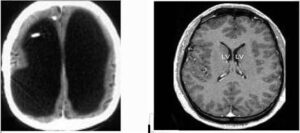 display of the brain’s adaptability, which enabled him to live a normal life. His IQ was reported to be 75, which is below the average of 100, but not low enough to be deemed mentally retarded or disabled. I suppose some would call that “the amazing brain” and nothing more, but the brain was created by God, and so could be fixed by God. In fact, I believe that this man’s brain could continue to improve over time. Still, he has led a good life. He is even married and has two children. For a man who is missing up to 75% of his brain, that is amazing.
display of the brain’s adaptability, which enabled him to live a normal life. His IQ was reported to be 75, which is below the average of 100, but not low enough to be deemed mentally retarded or disabled. I suppose some would call that “the amazing brain” and nothing more, but the brain was created by God, and so could be fixed by God. In fact, I believe that this man’s brain could continue to improve over time. Still, he has led a good life. He is even married and has two children. For a man who is missing up to 75% of his brain, that is amazing.

 Imagine being able to remember every day of your life, or maybe, not being able to forget any of it. Everyone is different, and the brain is quite mysterious. Some people have vague or no specific memories about their past, while others remember all the details of their lives. Some people can even give specific days, times, and weather conditions that were present at the time of a memory. Now, some people might call that a blessing, while others might see it as a curse. Either way, it is a bit of a novelty, to say the least. The condition is called Highly Superior Autobiographical Memory (HSAM), and as of 2017, fewer than 100 people were known to have the condition. The main characteristic of the condition is that the patient has a near-perfect memory for recalling dates and events. The scientific term for Superior Autobiographical Memory is Hyperthymesia. This form of memory is sometimes confused with Eidetic Memory, which is itself mistakenly associated with photographic memory. Superior Autobiographical Memory or Hyperthymesia is a confusing phenomenon, even for scientists.
Imagine being able to remember every day of your life, or maybe, not being able to forget any of it. Everyone is different, and the brain is quite mysterious. Some people have vague or no specific memories about their past, while others remember all the details of their lives. Some people can even give specific days, times, and weather conditions that were present at the time of a memory. Now, some people might call that a blessing, while others might see it as a curse. Either way, it is a bit of a novelty, to say the least. The condition is called Highly Superior Autobiographical Memory (HSAM), and as of 2017, fewer than 100 people were known to have the condition. The main characteristic of the condition is that the patient has a near-perfect memory for recalling dates and events. The scientific term for Superior Autobiographical Memory is Hyperthymesia. This form of memory is sometimes confused with Eidetic Memory, which is itself mistakenly associated with photographic memory. Superior Autobiographical Memory or Hyperthymesia is a confusing phenomenon, even for scientists.
The first person diagnosed with HSAM was Jill Price, who in 2000 emailed Dr James McGaugh, a professor in neurobiology and behavior at UC Irvine, about her memory problem. Strange that she called it a “memory problem” and not just an unusually good memory. Price wrote, “Whenever I see a date flash on the television…I automatically go back to that day and remember where I was, what I was doing, what day it fell on…” She described the experience as “nonstop, uncontrollable, and totally exhausting.” I think that part…especially the “totally exhausting” part, is something that most people wouldn’t even consider when it comes to memory, but then we have never been faced with a situation quite like that of Jill Price.
After receiving Price’s email, Dr McGaugh started researching the condition. Like most of us, it was something he had never given much thought to. His research took a long time, because information and case studies were pretty much non-existent, but in 2010, he appeared on 60 Minutes to discuss his findings. The 60 Minutes segment caused other people to reach out to him about their own version of the condition. Among the people who reached out to him was Joey DeGrandis, who had been aware of his near-perfect memory since he was 10. DeGrandis actually took a different approach to his situation than Price had. In fact, he treated his memory somewhat like a magic trick…even performing at a school magic show by accurately naming what day of the week any date in recent history fell on. He had previously considered his memory a novelty, he changed his opinion on it after hearing about other people with the condition and decided to take part in McGaugh’s studies.
The research into HSAM showed addition things that most of us wouldn’t thing about. One thing that the research showed was that many people with HSAM also suffer with obsessive traits. DeGrandis told Time he felt his HSAM contributed to his occasional bouts of depression and anxiety, as he struggles to let go of certain things. While many people think that HSAM is the same as having a photographic memory, that is actually not the case. Oddly, people with HSAM have no advanced memory when it comes to remembering things like names or faces. DeGrandis said in a 2017 interview with Time magazine, “I’m not great with names, or with mundane details like whether I brushed my teeth today or where I put my keys.”
I guess that we will never fully understand the human mind and memory, because while I can’t even begin to claim any link between HSAM and me, I find that I do quite well with names and faces, as well as remembering 
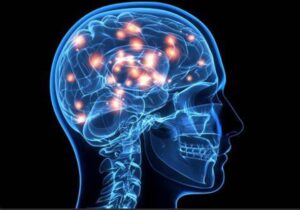 computer procedures (once I’m shown one time), and a pretty good aptitude for medical procedure (at least as it applies to caregiving). I consider these things, at least a little bit like a photographic memory, since I can actually picture the computer screens in my head when I’m explaining steps to take with phones or computers to my family. The mind is an amazing thing, and I doubt if we will ever fully understand all it is capable of.
computer procedures (once I’m shown one time), and a pretty good aptitude for medical procedure (at least as it applies to caregiving). I consider these things, at least a little bit like a photographic memory, since I can actually picture the computer screens in my head when I’m explaining steps to take with phones or computers to my family. The mind is an amazing thing, and I doubt if we will ever fully understand all it is capable of.
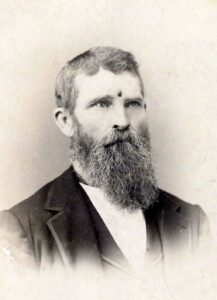 Anytime a soldier goes to war, the possibility exists that they will be severely wounded or even killed in action, but I don’t think anyone expected the events of September 19, 1863. It was the middle of the Civil War, and Jacob C Miller was a private in Company K, 9th Indiana Infantry Regiment. The company was fighting in the Battle of Chickamauga near Brock Field in southeastern Tennessee. One of the fastest ways to “get dead” is to get shot in the head. There is something about a bullet hitting the skull that puts an end to life pretty quickly…most of the time, anyway.
Anytime a soldier goes to war, the possibility exists that they will be severely wounded or even killed in action, but I don’t think anyone expected the events of September 19, 1863. It was the middle of the Civil War, and Jacob C Miller was a private in Company K, 9th Indiana Infantry Regiment. The company was fighting in the Battle of Chickamauga near Brock Field in southeastern Tennessee. One of the fastest ways to “get dead” is to get shot in the head. There is something about a bullet hitting the skull that puts an end to life pretty quickly…most of the time, anyway.
Maybe it was the type of bullets used in the Civil War, but no matter how it happened, I don’t think anyone would disagree with me when I say that living after taking a bullet between the eyes was a miracle. Jacob C Miller was just such a miracle man. After being shot, Miller crumpled to the ground. I’m sure everyone thought it was over, but Miller said later that he could hear the words of his captain, who said, “It’s no use to remove poor Miller, for he is dead.” The company, believing he was dead, moved on. Now, just imagine the shock when Miller became conscious and found himself alone. He raised up in a sitting position. Curiosity caused him to feel his wound. Clearly there was damage done. Miller’s left eye was out of place, and he tried to  place it back, but had to move the crushed bone back together, or as near together as he could first. Once the eye was in its proper place, he bandaged the eye the best he could with his bandana. Then he began the journey to get help. Miller struggled to follow his company, until he was finally picked up by a liter party, and taken for treatment.
place it back, but had to move the crushed bone back together, or as near together as he could first. Once the eye was in its proper place, he bandaged the eye the best he could with his bandana. Then he began the journey to get help. Miller struggled to follow his company, until he was finally picked up by a liter party, and taken for treatment.
When he was taken to the doctors, and they examined him, they said that they were able to see his pulsating brain quite clearly. That said, we know that the bullet wasn’t somehow stopped by his skull. It had actually entered the brain lining, or at least into the skull bone. At that point, nothing was done with the bullet, and Miller was sent home to Logansport, Indiana. Doctors there were hesitant to remove the bullet, because they thought Miller would die, and somehow, he seemed to be functioning ok with the bullet in place. In the end 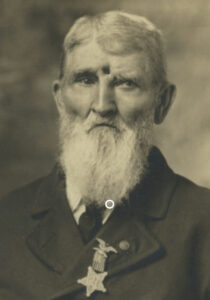 they did remove about a third of the bullet, and Miller went on to live his life. Nevertheless, more pieces of the bullet simply fell out decades later. It was as if his body just rejected the foreign pieces of lead and moved them out of his head. It was a good thing, because the pressure on the bullet fragments during times of illness caused his to become delirious. Once the fragments fell out, that stopped.
they did remove about a third of the bullet, and Miller went on to live his life. Nevertheless, more pieces of the bullet simply fell out decades later. It was as if his body just rejected the foreign pieces of lead and moved them out of his head. It was a good thing, because the pressure on the bullet fragments during times of illness caused his to become delirious. Once the fragments fell out, that stopped.
Miller was born on August 4, 1840, in Bellevue, Ohio. He was shot on September 19, 1863, at the age of 23 years. Private Jacob C Miller lived an amazing 54 years with an open wound in his head. The wound never fully healed, but did not fully penetrate his skull, and apparently the brain area did close over, and caused no damage to his brain. He died January 13, 1917, in Omaha, Nebraska at the age of 76 years. No cause of death is mentioned, but I guess we know it wasn’t a gunshot wound to the head.
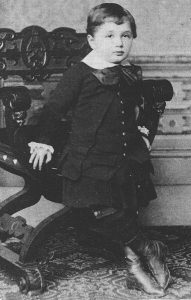 Albert Einstein has always been one of my favorite historic figures, so I decided to look for more information on him. I was surprised about some of the things I found out. Albert Einstein was born in Ulm, Germany in 1879, to parents Hermann Einstein and Pauline Einstein. Albert had a large head at the time he was born, so large, in fact that it startled his mother and grandmother when they saw him for the first time. The “fat” head slowly receded and turned into a normal size. Strangely, the head containing the brain of an amazing historic genius, was not so perfect at birth. Einstein did not speak until the age of three, odd for a genius. He revealed this fact about himself in his biography. Today there is a term, “Einstein Syndrome,” which was coined by Dr. Thomas Sowell, to describe exceptionally bright people whose speech is delayed. Einstein spent his teenage years in Munich, where his family operated an electrical equipment business. Galileo Galilei was Einstein’s favorite scientist.
Albert Einstein has always been one of my favorite historic figures, so I decided to look for more information on him. I was surprised about some of the things I found out. Albert Einstein was born in Ulm, Germany in 1879, to parents Hermann Einstein and Pauline Einstein. Albert had a large head at the time he was born, so large, in fact that it startled his mother and grandmother when they saw him for the first time. The “fat” head slowly receded and turned into a normal size. Strangely, the head containing the brain of an amazing historic genius, was not so perfect at birth. Einstein did not speak until the age of three, odd for a genius. He revealed this fact about himself in his biography. Today there is a term, “Einstein Syndrome,” which was coined by Dr. Thomas Sowell, to describe exceptionally bright people whose speech is delayed. Einstein spent his teenage years in Munich, where his family operated an electrical equipment business. Galileo Galilei was Einstein’s favorite scientist.
Albert Einstein’s lifelong love of science and math is no big secret, and in fact is what made him famous, that and his well know genius. That said, I was stunned to find out that his teachers did not  consider him a good student, and they refused to recommend him for further employment. It is said that at 16, Einstein failed an exam that would have allowed him train to become an electrical engineer. One of the things I found to be the most interesting is that Albert Einstein had a poor memory. He could not remember names, dates or phone numbers. I heard that he didn’t see the need to remember what he could have written down. Maybe this was why it needed to be written down. Most people know that he was given the Nobel Prize in 1921. It was the Nobel Prize in Physics that was awarded to Albert Einstein “for his services to Theoretical Physics, and especially for his discovery of the law of the photoelectric effect.” But, Einstein had a funny side too, and would have fit right in with the kids of today…at least in his picture taking. I really it wasn’t a selfie, but as selfies go, it fit right in with that the kids of today are doing, and apparently he though it was just as funny as they do. He was sure pleased with this one.
consider him a good student, and they refused to recommend him for further employment. It is said that at 16, Einstein failed an exam that would have allowed him train to become an electrical engineer. One of the things I found to be the most interesting is that Albert Einstein had a poor memory. He could not remember names, dates or phone numbers. I heard that he didn’t see the need to remember what he could have written down. Maybe this was why it needed to be written down. Most people know that he was given the Nobel Prize in 1921. It was the Nobel Prize in Physics that was awarded to Albert Einstein “for his services to Theoretical Physics, and especially for his discovery of the law of the photoelectric effect.” But, Einstein had a funny side too, and would have fit right in with the kids of today…at least in his picture taking. I really it wasn’t a selfie, but as selfies go, it fit right in with that the kids of today are doing, and apparently he though it was just as funny as they do. He was sure pleased with this one.
One of the most interesting things I found out was that Einstein was offered the opportunity to become  president of Israel after the its first president died in 1952. Einstein politely refused the offer, saying that he did not have the natural aptitude and experience to deal with people properly. He said that he could only understand a little of science and none of human nature. A little of science!!! Really!! I suppose that a genius would know and realize that just like the Bible, our understanding of science has only scratched the surface. Sadly, Albert Einstein had a “practical” view, if you will, of human life. He could have lived longer than he did. But, before he died, doctors suggested surgery to Einstein, because he suffered from a burst blood vessel. However, Einstein refused, stating, “It is tasteless to prolong life artificially.” I don’t understand why he ended such brilliance by refusing an operation that could save him. I find that very sad.
president of Israel after the its first president died in 1952. Einstein politely refused the offer, saying that he did not have the natural aptitude and experience to deal with people properly. He said that he could only understand a little of science and none of human nature. A little of science!!! Really!! I suppose that a genius would know and realize that just like the Bible, our understanding of science has only scratched the surface. Sadly, Albert Einstein had a “practical” view, if you will, of human life. He could have lived longer than he did. But, before he died, doctors suggested surgery to Einstein, because he suffered from a burst blood vessel. However, Einstein refused, stating, “It is tasteless to prolong life artificially.” I don’t understand why he ended such brilliance by refusing an operation that could save him. I find that very sad.

